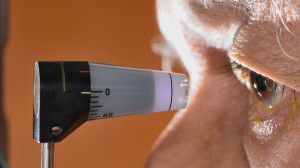Posted by: Aker Kasten Eye Center in Glaucoma on February 27, 2015
 Glaucoma is a condition which damages your eye’s optic nerve of your eyes and worsens over time. Many times it’s associated with the buildup of pressure in the eye itself. It is usually inherited genetically and could show up later on in life due to old age.
Glaucoma is a condition which damages your eye’s optic nerve of your eyes and worsens over time. Many times it’s associated with the buildup of pressure in the eye itself. It is usually inherited genetically and could show up later on in life due to old age.
Intraocular pressure, or an increase of pressure within the eyeball itself, could damage the optic nerve, which transmits images to the brain. Because of this, glaucoma will eventually result in permanent loss of vision if it is not treated and damage to the optic nerve is allowed to continue. Glaucoma will cause complete and permanent blindness in just a few years if it is left untreated.
Most people generally do not experience any specific symptoms with glaucoma. Sometimes, if your intraocular pressure rises to severe levels, you may experience headaches, sudden eye pain, or blurred vision. The first sign of glaucoma is often the loss of your peripheral vision, and even that can go unnoticed until the disease is in its later stages.
If you have any of these symptoms, seek out immediate medical care:
- Vision loss
- Seeing halos around lights
- Eyes which appear hazy
- Redness in the eye
- Eye pain
- Vomiting or nausea
- Narrow vision or tunnel vision
Blindness caused by glaucoma is irreversible. However, successfully lowering the eye pressure can help to stop further vision loss. Most people with glaucoma won’t go blind if they keep up with their treatment plan and attend regular eye exams.
Because glaucoma is so hard for you to detect on your own, and has such serious consequences, it is important to have regular eye exams with an optometrist. Professionals recommend seeing an eye specialist every one to two years, in part to detect glaucoma early. Contact your eye doctor immediately if you are experiencing any of the above systems, so her or she can perform a thorough eye exam. The sooner any problems are detected, the better. You might not be able to get rid of glaucoma, but you can treat it and save your vision.
